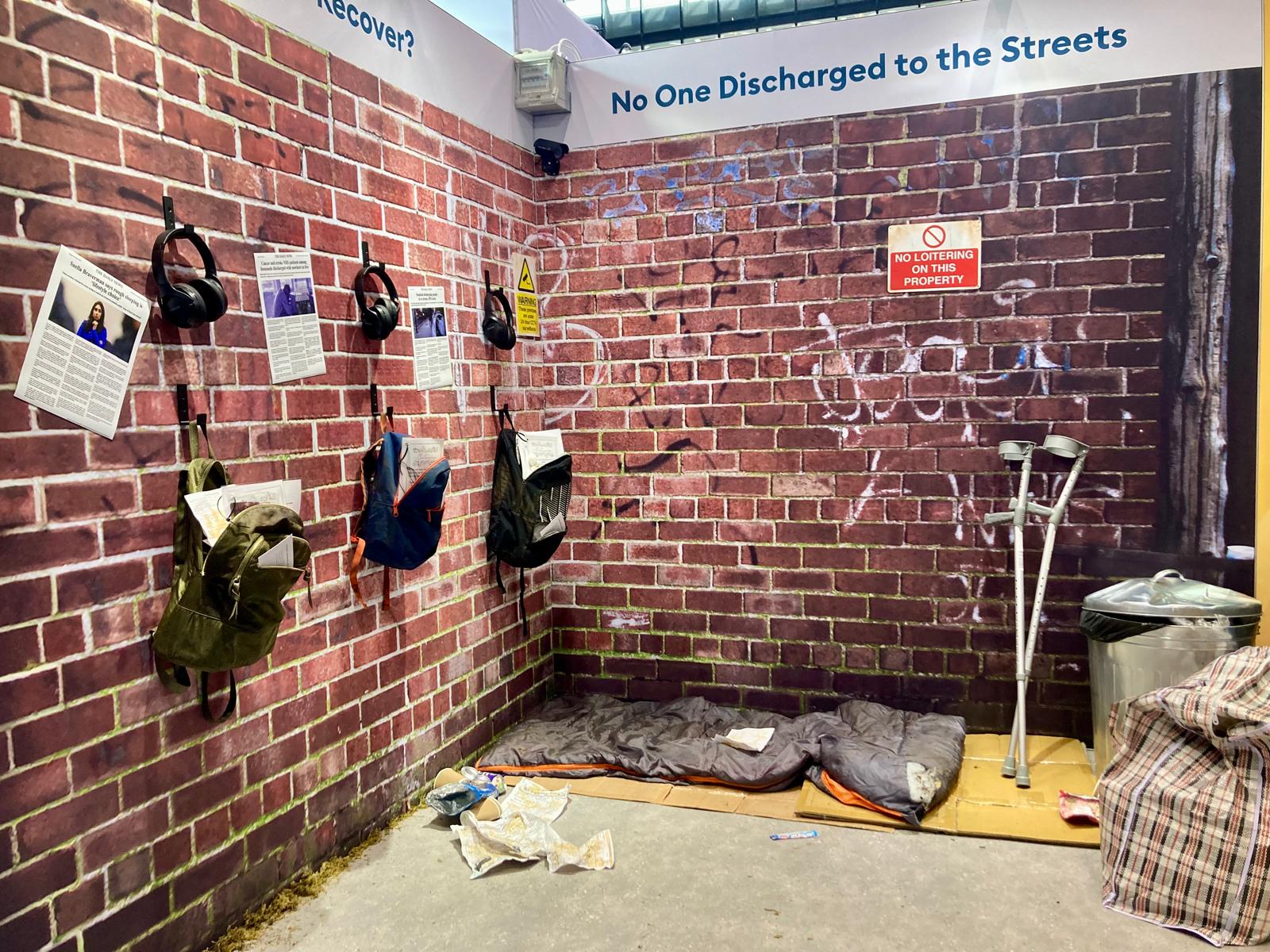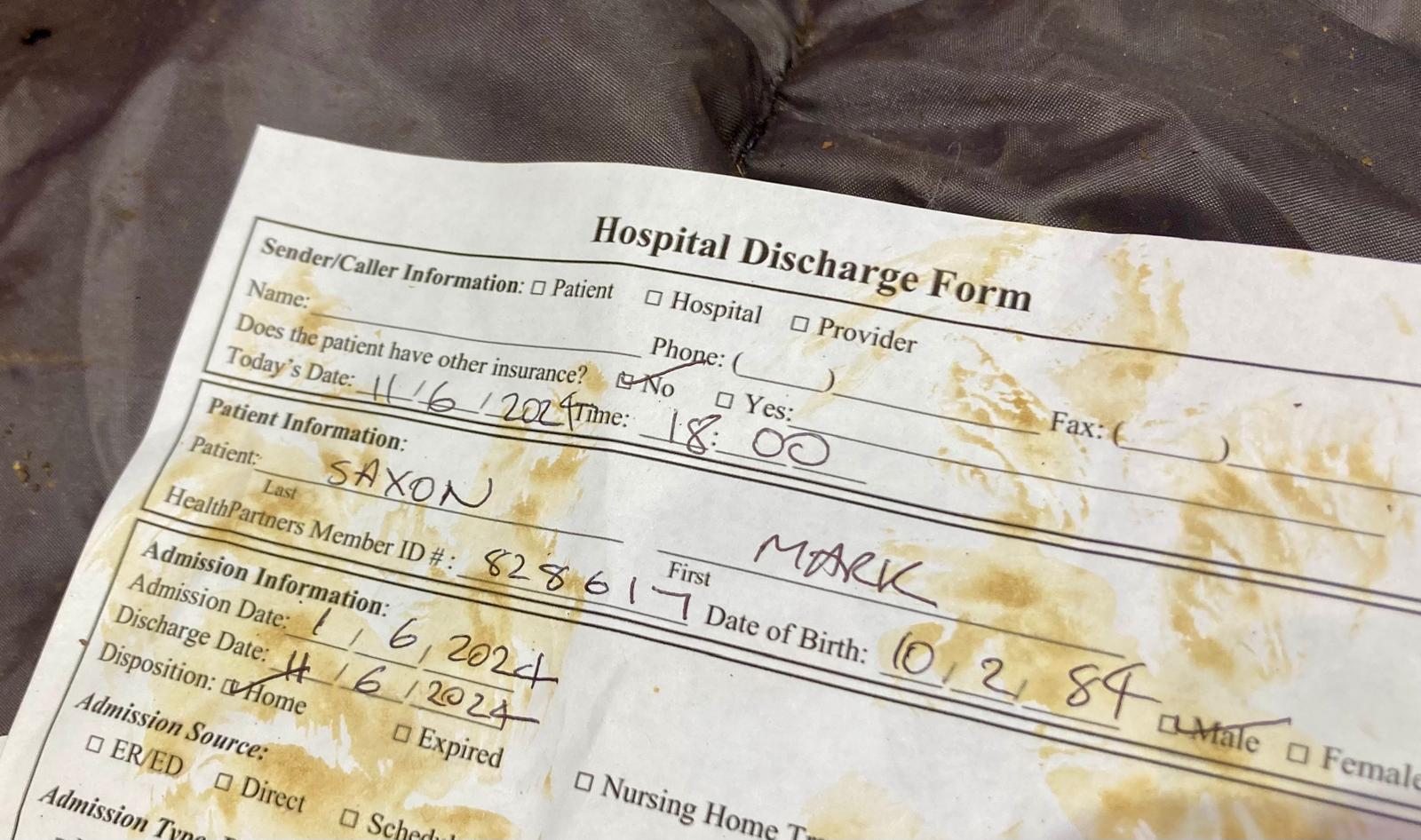FOR IMMEDIATE RELEASE – 19.09.2024
- The special installation was designed with people who have lived experience of homelessness and reveals the harsh reality faced each year by over 4,100 patients discharged from hospital to no fixed abode.
- It is designed to look like a place someone facing homelessness might sleep rough, and asks ‘is this a safe place to recover?’. The installation features hospital paraphernalia such as discharge letters and prescriptions and is hosted by Pathway, the homeless and inclusion health charity.
- The exhibit’s appearance at Labour Party Conference follows Lord Darzi’s independent investigation into the NHS in England, which drew on Pathway’s evidence to illustrate the desperate state of health of people facing homelessness.
- Pathway is calling on the Government to commit to ending discharges to the street in the cross-Government Homelessness Strategy and the 10-year NHS plan, and provision of the necessary intermediate care and specialist hospital care to achieve this.


Following an FOI request to hospital trusts in England earlier this year revealing that at least 4,200 people were discharged into homelessness in 2022/23, Pathway will present its immersive exhibit at the Labour Party Conference from 22nd to 25th September to highlight this critical issue.
Being discharged onto the streets while recovering from serious illness is catastrophic for a person’s health, requiring them to deal with challenges around wound care, new medications, and mobility issues whilst lacking even the most basic facilities. Inevitably, this failure to address homelessness during recovery leads to repeat admissions, adding to the current NHS crisis.
As reported in Lord Darzi’s recent review of the state of the NHS in England, health services are facing levels of pressure unprecedented in modern times, with the push to free up hospital beds resulting in people facing homelessness being discharged whilst still recovering from treatment. At the same time, ongoing housing shortages have seen homelessness rates escalate, with over 112,000 households now in temporary accommodation—an increase of 12% from the previous year—and 3,898 people rough sleeping each night, marking a 27% rise from the year before. The result of these twin crises has been a huge increase in discharges from hospital to the street.
The solution, which is endorsed by the National Institute for Health and Care Excellence, is ‘step-down’ accommodation. Also known as intermediate care, it offers safe, short-term housing and support for individuals recovering from a hospital admission. It links them to essential services like GPs, provides additional time to secure long-term housing, aids in their recovery, and helps free up crucial hospital beds by reducing preventable readmissions.
A recent evaluation of intermediate care for people facing homelessness in one county in England found a 56% reduction in A&E visits and a 67% reduction in emergency admissions. This saved £47,000 of NHS funding per patient.
Despite the benefits, there are insufficient step-down services to meet the increasing demand. An audit of 11,000 patients experiencing homelessness revealed that 79% were discharged to locations that failed to address their needs, such as the streets or unsuitable temporary accommodation. Furthermore, a recent survey of inclusion health professionals found that only 3.9% believed there was enough specialised homeless intermediate care available in their area for those in need.
In 2021, the previous Government introduced the £16m Out of Hospital Care Model Programme to provide more intermediate care for individuals facing homelessness upon discharge from hospital. Subsequently, a recent evaluation found that although the funding initially supported the creation of new services, many of these shut down once central funding was discontinued.
Professor Michelle Cornes, University of Salford and lead researcher of the evaluation said, “We know step-down intermediate care improves people’s quality of life and can end homelessness. However, not enough is being provided. My study of over 11,000 patients facing homelessness suggests 79% of them were discharged to somewhere unlikely help them to recover. This could be back to the street or to a hotel or other temporary accommodation with no support.”
Pathway is calling on the new Government to ensure that no one will be discharged from hospital to the street, backed by the necessary scaling up of intermediate care and specialist hospital teams to make this a reality.
Concerted cross-Government action is needed, including through the cross-Government homelessness strategy, to build the social housing we so desperately need.
To highlight the issue, they are hosting an immersive exhibit at the Labour Party Conference in Liverpool illustrating the experience of being discharged from hospital to the street. Co-designed with people with lived experience, this immersive scene illustrates the dire conditions of a rough sleeping site and asks, “is this a safe place to recover?”
Alex Bax, Chief Executive of Pathway said:
“Everyone deserves somewhere warm and safe to recover after an illness, but the shameful reality is that many people find themselves with nowhere to go but the streets upon leaving hospital – the same streets that often made them ill in the first place.
This puts more pressure on the NHS, as it makes it more likely that person will be readmitted to hospital later. It doesn’t have to be like this. With a new 10-year plan for the NHS on the horizon, this Government has a crucial opportunity to end this unacceptable situation by committing to increasing the availability of specialist intermediate care and hospital-based homeless health teams.”
To arrange an interview with a spokesperson, Lived Experience Volunteer, or enquiries regarding filming or photography, please contact the Pathway media team at jonathan.lucas@pathway.org.uk.
NOTES TO EDITORS
Discharges to the street
- An FOI exercise of all hospital trusts in England revealed 4,200 people were discharged to No Fixed Abode. This figure represents half of all trusts (those who responded to the FOI).
- Intermediate Care is a multidisciplinary service designed to help maximise people’s independence, providing support and rehabilitation to people at risk of hospital admission or who have been in hospital. In the case of people recently discharged, this is known as “step-down care” and aims to ensure that people rejoin the community in a timely, sustainable way and prevent avoidable readmissions.
- Professor Michelle Cornes is Professor of Health and Social Policy Inequalities at the University of Salford. She is a Visiting Professor at the Policy Institute at King’s College London and a leading researcher in the Homelessness Research Programme in the NIHR Policy Research Unit in Health and Social Care Workforce within the Institute, leading the evaluation of the 2021 Government-funded Out of Hospital Care Model programme.
- This campaign to end discharges to the street will be a major focus of Pathway’s work over the next year.
Installation at the Labour Party Conference
- Pathway will host an immersive installation at Stand J13 the Labour Party Conference in Liverpool from 22-25 September 2024, depicting the reality of rough sleeping upon discharge from hospital.
- Appearance of the installation at the conference follows the release of Lord Darzi’s independent review of the NHS in England, which lays bare the critical condition of services, and the extreme health inequalities facing the nation. Pathway contributed evidence to the review as a member of its expert panel.
- The installation has been co-created with members of Pathway’s Lived Experience Programme, made up of people who have experience of homelessness, including rough sleeping, and health inequalities. The volunteers who led the project’s design will also be available for interview.
- Attendees will have the opportunity to experience the sights and sounds of rough sleeping; a soundscape of street environments will be available to listen to, with rucksacks containing personal belongings and real-life stories, as curated by members of Pathway’s Lived Experience Programme, available to view and read.
- The experience will also provide attendees with an understanding of the complex medical needs and conditions that an individual might be required to manage in such an unsafe environment.
About Pathway
Pathway is the UK’s leading homeless and inclusion health charity. We exist to improve the health of people experiencing homelessness and other forms of severe social exclusion. Pathway’s Partnership Programme supports NHS organisations to scope, commission and create local Pathway teams to improve outcomes for in-patients facing homelessness.